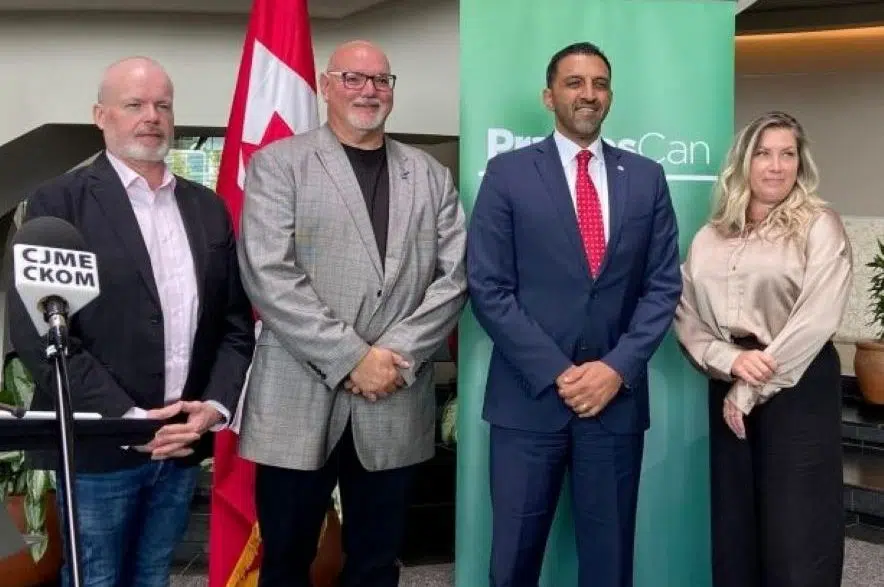Virtual health-care services in Saskatchewan like 811 are getting a boost.
Through funding provided by Prairies Economic Development Canada (PrairiesCan), Lumeca Health Inc. has created a software to improve virtual medical assessments.
Lindsay Brownridge, the vice-president of administration with Lumeca, said the software improves something nearly everyone already has access to: A smartphone.
“Smartphones have so much potential to share rich data from pictures to video to GPS, yet when you call 811 or 911 today, very little of this information is able to flow down to the health-care providers or first responders who are receiving the phone call. Lumeca is changing this,” she said Friday.
The new software, which is called Lumeca Go, gives health-care providers a visual during a phone call.
“Imagine calling 811 with a sick child. The child has a rash or burn and you’d like further information on if you should seek medical services,” Brownridge said. “With the new technology, the nurse or doctor can text you a link. This link allows the health-care provider to temporarily access your camera or GPS, if required, in as little as three clicks without hanging up the phone or downloading an app.”
The health-care provider can then assess the child over the phone and provide essential information that could prevent unnecessary hospital visits or ambulance calls. The provider can even get a prescription sent to the patient’s pharmacist over the phone, or they can provide an alternative course of care from home.
The technology is being used by the Saskatchewan Health Authority (SHA) in two ways: The 811 virtual triage physician (VTP) program and the virtual ER physicians program.
“A picture is worth a thousand words,” Brownridge said. “Early numbers have shown that 80 per cent of patients who would normally be advised to seek medical care at the nearest emergency department are being directed to alternative forms of care (with the help of the new software).
“Being able to divert patients to other forms of appropriate care offers a new solution to overcrowded emergency departments. As a patient, this is a much better experience than having to wait hours in an emergency department waiting room for a minor condition.”
She said the service will greatly benefit rural hospitals, some of which have had to deal with closed ERs in recent years. The technology is already being used in Porcupine Plain and Oxbow, with more locations to be added soon.
“Without Lumeca’s software, this pilot program would not exist, and many of these rural emergency departments would continue to have temporary closures,” she said.
PrairiesCan provided funding through three different programs.
Lumeca’s funding of $200,000 was provided by the Business Scale-up and Productivity (BSP) program.
The Regina & District Chamber of Commerce is getting $250,000 under the Community Economic Development and Diversification (CEDD) program.
Tony Playter, CEO of the Regina and District Chamber of Commerce, said the funding will directly support immigrant, minority and Indigenous business owners and entrepreneurs.
“We’re very pleased to be part of the funding agreement. It’s opening opportunities for us to reach out into newer communities and help nurture that entrepreneurial spirit in our community. It’s going to help grow businesses. It’s going to help new entrepreneurs and for businesses that have been operating for three to five years or so looking to expand and grow,” he said.
Playter said the biggest problem right now is funding and creating a strong business plan.
“That’s one of the things we’re working on: How do we get those pieces together for them so that they have a business plan and they can take that next step? We’re trying to help them walk that path to grow or create their business,” said Playter.
He thinks this will diversify the economy. It will make young people, newcomers and minorities feel like they can be entrepreneurs in Saskatchewan.
Lastly, $150,000 is being provided to the Saskatchewan Interactive Media Association Inc. through the Regional Innovation Ecosystem (RIE) program. The funding will be used to conduct various studies and surveys on Saskatchewan’s digital technology sector.
Calgary Skyview MP George Chahal made the announcement on behalf of Dan Vandal, the minister for PrairiesCan.
“We want to make sure we can use this funding to help understand better the needs of Saskatchewan and making sure that technology that’s being incorporated, that businesses understand where those opportunities lie,” said Chahal.
He said the funding provided to the three different organizations will help the province continue to grow and make technological advancements.
“It’s important to recognize the importance of our western economy. Today’s announcement touches health care and technology, which are so important for everybody across the province,” Chahal said.
“The work the Chamber is doing to make sure our diverse, minority and Indigenous communities are also given those opportunities to be able to build and grow their businesses in Regina and across the province (is vital).”







